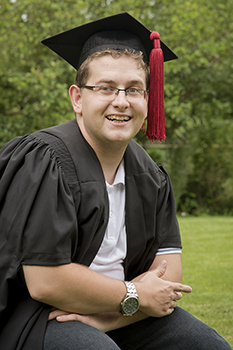Motho ke motho ka batho. A person is a person through others.
Video
Student Bursary Fund Campaign booklet (pdf)
Donate
Student Bursary Fund Campaign launched: #FundAFuture and make a difference
“I never imagined that I would have the opportunity to study further. For that to happen, the heavens had to forge a way.” Mixed feelings dapple Jean-Pierré van der Walt's face as he recounts the miracles - and hardships - of his journey.
Motho ke motho ka batho. A person is a person through others. |
Jean-Pierré is one of ambassadors of the Student Bursary Fund Campaign, launched by the University of the Free State (UFS). The project aims to raise R100 m to fund talented, deserving students who do not have the financial means to obtain a university degree. This financial support will change the future irrevocably for many young people in our country, young people who are similar to Jean-Pierré.
 Jean-Pierré van der Walt
Photo: Sonia Small |
“When I was in matric, going to university was never an option.” Surmounting his financial circumstances seemed impossible. “It made me feel despondent, and I thought to myself: after school, what would my life be like, where am I going?” It was at this juncture in his life that a funding opportunity enabled him to pursue his dream of making a difference in the world through education. He embarked on a BEd degree in Senior and FET (Further Education and Training) Teaching, which he completed in 2015.
“Varsity taught me to stand up for myself, to make my voice heard,” Jean-Pierré says. “If I did not have the opportunity to attend university, I would have missed my calling in life: to show the world that, despite your physical restrictions, you can still make a difference.” Jean-Pierré is differently-abled as a result of cerebral palsy.
Looking to be placed as an English and Sesotho teacher, Jean-Pierré is eager to teach children that anything is possible, regardless of heritage, family life, or circumstances. “Motho ke motho ka batho. A person is a person through others,” he says is the philosophy he lives by. “One cannot survive in solitude; one needs others to go further in life.”
In the same way, the UFS needs your support and generosity. Each contribution will bring us closer to our goal of R100 m, and to changing the landscape of our youth’s future.
Visit our Giving page for ways to donate.
For enquiries or further information:
T: +27(0)51 401 3966 | E: FundAFuture@ufs.ac.za | www.ufs.ac.za